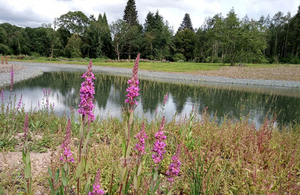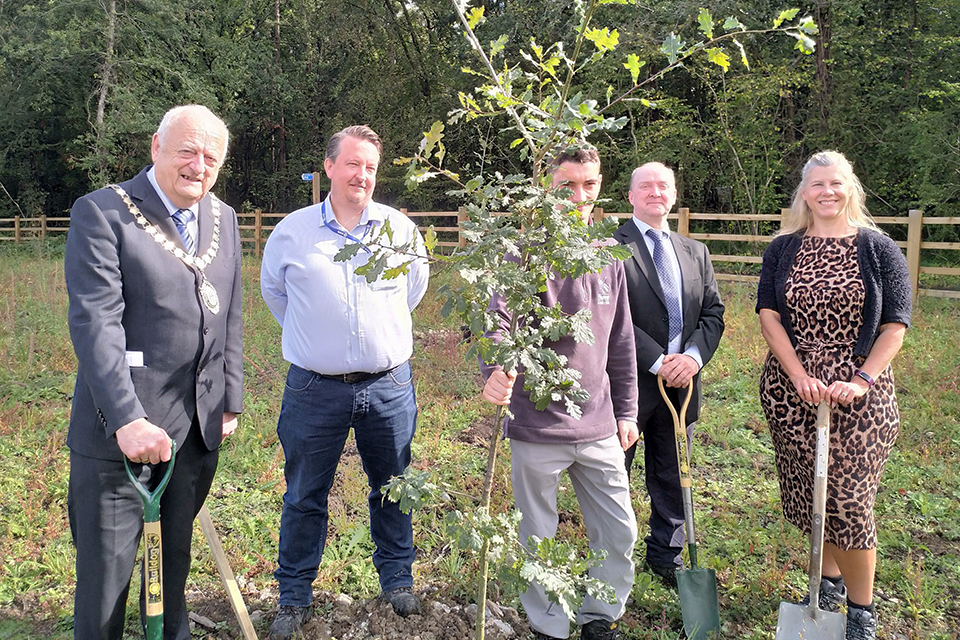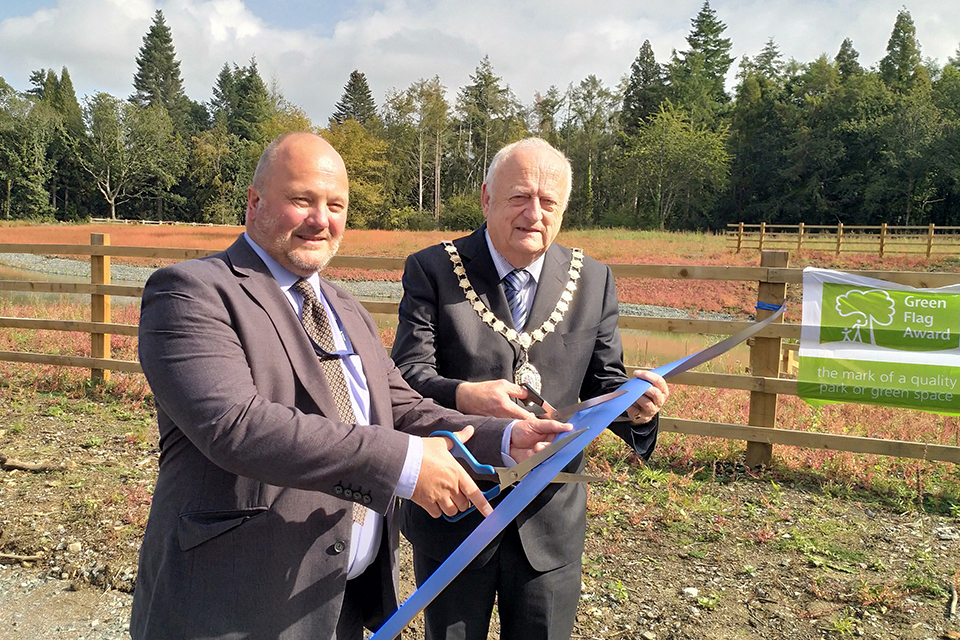Tree-planting event celebrates reedbed scheme at Devon beauty spot
The completion of a giant reedbed scheme designed to attract an array of wildlife as well as help to keep water clean was celebrated yesterday at Stover Country Park in Devon.

Stover reedbed
The sustainable scheme, which has delivered an impressive 3,800 square metres of reeds at the park just off the A38 is the result of a ground-breaking partnership project between Highways England, Stover Country Park and Devon County Council. Natural England also supported the work.
The reeds act as a filter capturing and filtering water run-off from the A38 and Drumbridges roundabout before it enters the lake. Water can carry pollutants such as oil and metal residue into the lake and this has contributed to the poor water quality and reduced diversity of wildlife in the lake.
The reeds have been planted upstream of the lake to act as a natural barrier and filter pollutants. They will also provide valuable habitat for a range of wildlife. At the same time, the park, which is designated as a Local Nature Reserve and a Site of Special Scientific Interest (SSSI), will be improving sustainable drainage at the site. Planting was completed in April and already many areas of reeds have reached a height of 30cm.

Councillor Mathews, Tina Barrington, Designated Funds Environmental Lead for Highways England, Mark Rands of South West Highways and Kier’s David Olorenshaw.
Highways England Project Manager Darren Painter said:
Our designated funds programme was developed so that we can invest in projects beyond our traditional road build and maintenance, and this is a glowing example of how this funding can have a positive impact on people and communities.
Working with our partners on such a great environmental scheme has been a real pleasure and we’re delighted that the reeds have established so well. The reeds are currently establishing their root systems and we anticipate a full bed of green reeds in the next two years.
The twin reedbed system starts by providing a physical barrier to silted and polluted water, then chemical and biological mechanisms work in combination to break down even more pollutants resulting in clearer water which will help the lake to regenerate and flourish.
It is hoped that by reducing the silt deposits and contamination, white-water lilies, not seen at the lake since 2007, will once again start to cover the lake surface, providing suitable habitat for a variety of dragonflies and damselflies.
The reedbeds themselves will also support a range of birds, insects, reptiles, amphibians and mammals such as water rail, hairy dragonfly, grass snake, Daubenton’s bat and otter.
Rob Ballard, Ranger at Stover Country Park, said:
We are very pleased with how the sustainable drainage system has been developed. Everyone involved took on board the importance of developing a functional system that also enhances the ecological value of the park.
The system is an incredible asset; species such as Emperor and Common Darter dragonflies, heron, kingfisher and roe deer have already been seen in the reedbed ponds and surrounding areas.
Re-establishment of the species rich grassland is under way with various wildflowers such as Purple Loosestrife and Bird’s-foot Trefoil colonising, among others.
Initial water sampling indicates the system is already having an effect by improving the quality of water entering the Lake. As the reeds develop and establish we should see a marked difference in both water quality and species diversity in the park.
Councillor Roger Croad, Devon County Council Cabinet Member with responsibility for Environmental Services, added:
We’re proud to have played a part in this important project which will protect the rich biodiversity that we’re fortunate to have at Stover Country Park.
The completed scheme is incredibly impressive – and will make a huge difference to the water quality in the lake. As a SSSI and designated as an official “Dragonfly Hotspot” by the British Dragonfly Society, wildlife can thrive at the Country Park with the help of ecological schemes like this.
Work at the site started in late November 2018 and was completed at the end of June. To create the reed bed, 6,000 tonnes of soil was removed and four varieties of reed native to the area were planted.

Devon County Council Chairman John Mathews and Michael Whitehead, Principal Environment Advisor for Highways England.
The reedbed was officially opened by Devon County Council Chairman John Mathews and Michael Whitehead, Principal Environment Advisor for Highways England, at a ribbon-cutting event, and this was followed by the planting of four oak trees by Councillor Mathews, Tina Barrington, Designated Funds Environmental Lead for Highways England, Mark Rands of South West Highways and Kier’s David Olorenshaw.
Highways England is committed to a national Biodiversity Plan which is being supported by a national investment programme over the next five years.
The plan recognises road verges and associated land can be managed to provide areas of habitat, relatively free from human access, that may be scarce in the surrounding landscape.
These road verges can also be used to connect fragmented habitats in the wider landscape, enabling plant and animal populations to move and interact, and so become stronger and more resilient.
The Government allocated £675 million of funds to Highways England over a five-year spending period covering 2015 to 2020 – a series of ring-fenced funds designated to address a range of issues including Environment, Cycling, Safety and Integration, Air Quality and Innovation.
The Highways England Environmental Designated Fund of £225m has been set up to improve the environmental performance of the Strategic Road Network. It is to be used for projects that are ‘beyond business as usual’ which will help achieve benefits for one, or preferably a combination of areas including: cultural heritage, biodiversity, landscape, flooding and water quality, carbon emissions and noise pollution.
Elsewhere in the South West, designated funding is also helping Highways England to support Stroud District Canal and the Cotswold Canal Trust in a £4 million project to restore a section of the Cotswold Canal near M5 junction 13, assisting Cornwall Council to deliver a number of cycling, habitat and heritage projects alongside the A30 and supporting Sustrans to deliver a number of cycling initiatives around the new M49 junction scheme at Avonmouth, as well as funding a cultural heritage project to enhance the historic Stoke Park landscape alongside the M32 in Bristol.
For more information please visit the Highways England Designated Funds page.
General enquiries
Members of the public should contact the Highways England customer contact centre on 0300 123 5000.
Media enquiries
Journalists should contact the Highways England press office on 0844 693 1448 and use the menu to speak to the most appropriate press officer.